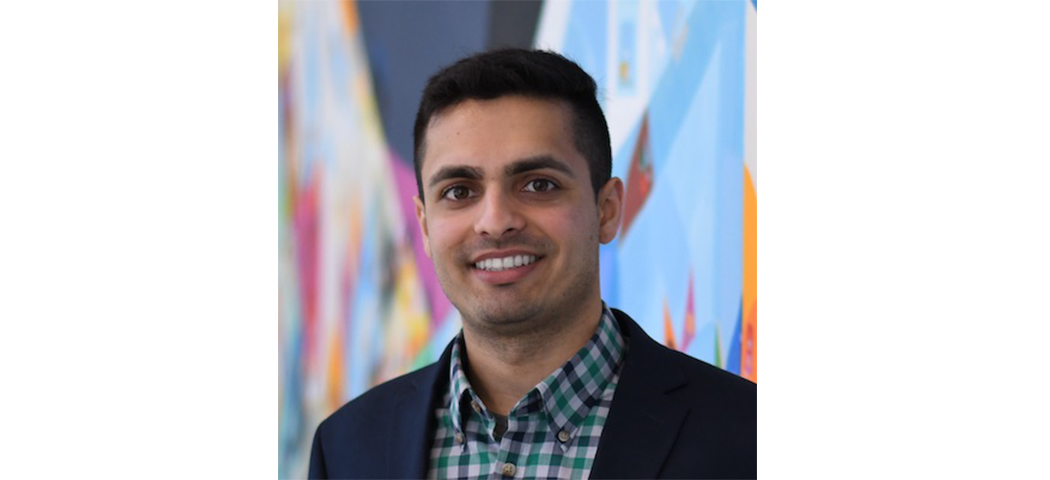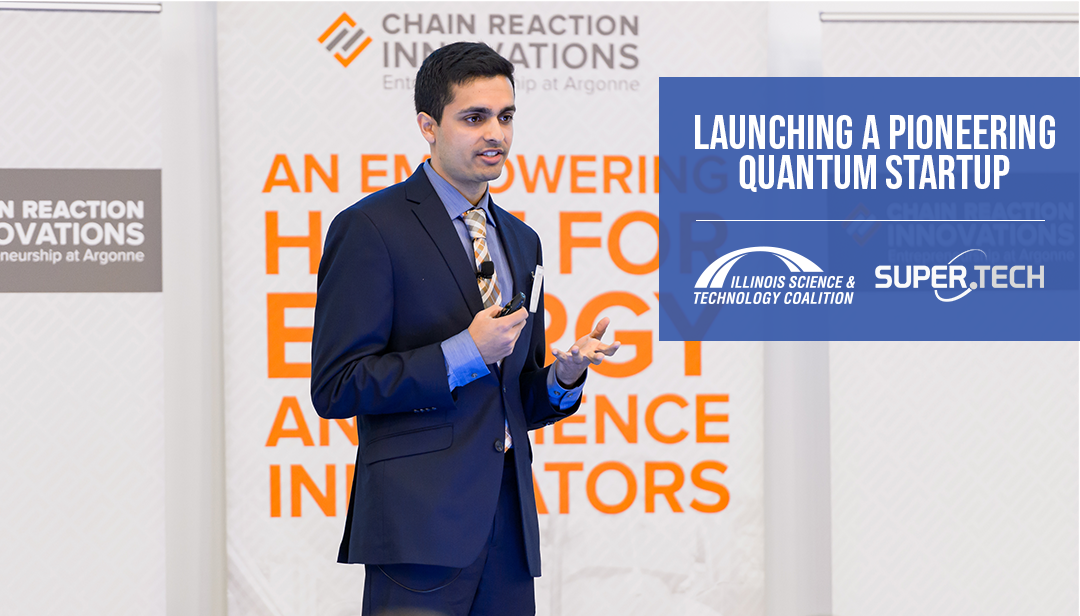In October, we partnered with the Chicago Quantum Exchange (CQE) to explore the evolving landscape of Quantum Information Science (QIS) in Illinois—including how researchers in the state are learning to harness the technology and building relationships with industry along the way. In this Catalyst Conversations, we hear from Pranav Gokhale, Founder of Super.tech about launching a pioneering quantum startup, Chicago’s entrepreneurial ecosystem, the role quantum will play moving forward, and much more.
1. Tell us about your background. What in your career led you to become a startup founder?
I grew up in suburban Maryland, near the National Institute of Science and Technology (NIST) laboratory. Through NIST’s science outreach programs, I became interested in quantum technology and I had the opportunity to intern in their quantum cryptography and ion trap labs. Based on those positive experiences, I studied computer science and physics in college, which have a natural intersection in quantum computing. In parallel, I caught the entrepreneurship bug. I think there’s something really special about what a small but dedicated team can do when they have an exciting vision. I wound up working at two Silicon Valley technology startups after college graduation. I loved both jobs, but in 2017 I became keenly aware that recent experimental strides meant that quantum computing was now closer to reality. I felt this was not an opportunity to miss, and I was also fortunate to meet Professor Fred Chong from UChicago.
One thing led to another and I joined Fred’s lab in fall 2017, with a research focus on closing the gap from near-term quantum computers to practical applications. As our research progressed to more and more commercially relevant outcomes, spinning off a company felt like the natural next step after my PhD defense. While academia is important for proof-of-concept oriented research, industry has the right incentives for transferring research into a usable product. Super.tech is aiming to do exactly that.
2. Your startup, Super.tech, has really gained steam in recent months. Tell us about how Super.tech came together and the technologies you’re pursuing.
Super.tech is a spin-out of research in Professor Fred Chong’s quantum computing group at UChicago. The core philosophy behind Super.tech is that quantum programmers should be aware of the underlying hardware. This is akin to traditional computing in the 1940s, when programmers like Grace Hopper might find that a pesky moth (a “bug”) had broken the computer. While we certainly don’t expect to see moths inside quantum computers, we do deal with high component failure incidence, just as in traditional computers from the 1940s. And yet, the existing quantum software frameworks typically assume the underlying hardware has perfect and abundant qubits (quantum bits). Our technology breaks this assumption and allows the quantum software to better match the restricted and imperfect hardware underneath. We think that our technology and strategy will enable us to accelerate the timeline for practical quantum computation.
3. Why quantum? What excites you about the technologies made possible by quantum information science (QIS)?
QIS is exciting because it can fundamentally change what is scientifically possible. In the particular domain of quantum computing, what’s incredible is that qubits (quantum bits) can be exponentially more powerful than traditional bits. As a result, there’s an entire class of problems that are virtually impossible to solve even on a supercomputer, but would be easily solvable by a quantum computer. For example, with a few hundred perfect qubits, we could figure out how to biomimic the process of nitrogen fixation. This process is needed for the production of fertilizer, which accounts for 2% of the world’s entire energy expenditure. Quantum computing will enable us to dramatically reduce that energy burden. While many of these applications will materialize in the longer term, we think that quantum computing will also enable nearer-term speedups for use cases in energy, finance, and logistics. And that’s just quantum computing—other areas of QIS like quantum sensing and networking enable another suite of applications as well.

Pranav Gokhale, Super.tech, Founder
4. Being a relatively new field, there aren’t many quantum startups. What challenges does that present? What opportunities does it provide?
One challenge is that there are a lot of unknowns. What is the right business model for a quantum company? Is our market timing too early, too late, or just right? How do we price our product in the absence of a competitive market? On the other hand, I think it’s exciting that we get to be among the first to answer these questions—the lack of precedent is an opportunity. We are fortunate to be in a generally pre-competitive era, where we are collaborating with other companies under win-win terms. Finally, I think we’re well positioned to recruit top quantum talent, much of which is being incubated by Chicago and Midwest universities.
5. In June, Super.tech received an $150k investment from UChicago’ George Shultz Innovation Fund. How was that investment boosted your growth? What other resources have you leveraged to get the startup off the ground?
The GSIF investment has enabled us to boost our product development pace and establish ourselves as a key player in the quantum space. It also kickstarted a number of useful introductions, which actually led to follow-on investments—stay tuned! I also had the chance to virtually meet with George Shultz, who offered his kind words and wisdom, which was cool.
More broadly, we’ve also leveraged resources from Chicago organizations such as Argonne Chain Reaction Innovations, Chicago Quantum Exchange, P33, and the Polsky Center. One of the highlights has been joint CQE-P33 organized workshops facilitating interaction between large Chicago businesses, quantum academics, and quantum startups. We also benefited from participating in the I-Corps customer discovery program led by the Polsky Center earlier this year.
6. You recently joined Chain Reaction Innovations (CRI) at Argonne National Laboratory. Congrats! What interested you about CRI, and what are you looking to accomplish while in the program?
Thanks! CRI has been fantastic. For context, CRI is an incubator at Argonne, primarily focused on deep tech startups relevant to the Department of Energy. This is important because unlike building a traditional web or software startup, a successful quantum startup will require careful coordination with government and private industry before there is a payoff. CRI provides that opportunity, along with education and guidance around navigating the world of federal funding and government contracts, which can be quite a maze for a newcomer. At a high level, we expect that our CRI tenure will lead to (a) close government relations including funding through programs like SBIR and (b) development of a business model and strategy for engaging with industry. I’ve also learned a lot from my CRI peers—especially from past CRI cohorts—who have valuable wisdom to dispense.
7. What is your perspective of the quantum community in the greater Chicago area? How do you see quantum startups fitting into the region’s entrepreneurial ecosystem in years to come?
Chicago has a tremendous opportunity to become the nation’s leader in quantum technology. And it’s getting there. I think it’s fair to say that Chicago has been the quantum winner of 2020. Look no further than the fact that two of the five National Quantum Initiative Centers were recently awarded to Chicagoland via Argonne and Fermilab. The credit for Chicago’s recent successes in quantum can be attributed to organizations like the Chicago Quantum Exchange and P33. I think the next step involves technology transfer from academia and government research to private industry. Given the concentration of quantum activity, talent pool via our universities, and abundant manufacturing space, many of the seeds are in place for the industry to grow. That’s why Super.tech is based here, and we’d like to see other quantum companies emerge here too.
Originally published by the Illinois Science & Technology Coalition. Read the article here.


